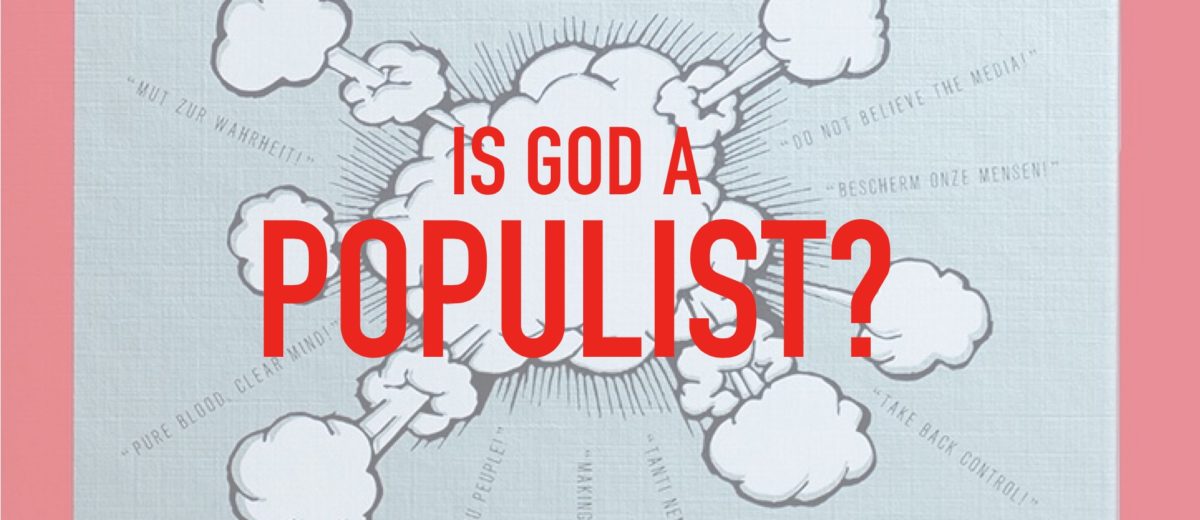For some, Britain’s Friday-the-13th election outcome was a scary twist of comedy into tragedy; for others, an unexpected answer to prayer.
One thing is certain. Politics these days is topsy-turvy, disturbing, polarising, confusing and unpredictable.
Thank God then for some words of sanity to help settle our nerves, soothe our emotions and clear our minds over this Christmas break, bundled together into a volume entitled: Is God a populist? – Christianity, populism and the future of Europe.
The Norwegian Christian think tank Skaperkraft has given us a timely book with contributions by a range of experts across Europe; from internationally-known names such as the 93-year-old Jürgen Moltmann (Germany) and Nick Spencer (Britain), to those locally-known in Spain, Sweden and Slovakia.
The past decade has seen a remarkable increase across the continent in references to Christianity in European politics, mainly by populist politicians. What is going on? How should Christian leaders respond? What is behind the deeply-rooted discontent calling for major change? What has led to a situation where one third of the thirty-three European governments now include populist parties, supported by 26.8 per cent of the European votes in 2018?
This book aims to prompt conversations among Christian leaders, policy-makers and Europeans generally, and to prod Christian leaders to ponder why churches are not meeting the need that populists seem to be filling with their talk of the Christian heritage of Europe.
Bird’s eye
The first section offers a bird’s eye view of the slippery concept of populism, which editor Susan Kerr calls a ‘doubled-edged sword’: on the one hand encouraging democratic participation, as in the US civil rights movement led by Martin Luther King, or on the other destroying democracy, as in Venezuela under President Maduro. Luke Bretherton cites the positive examples of the early British Labour movement and the Solidarity movement in Poland. But when populism claims to identify all the people with the interests of a part, and thereby excludes others, he adds, it becomes anti-Christic.
Moltmann’s point is that when nationalists place their own people’s interest first (‘our country first’), they deny the commonality of humankind sharing a common earth. Christians should confront populism with universal solidarity, he says, for the church is an anticipation of the universal kingdom of God and can never be limited to a national religion.
Christel Ngnambi, who represented the European Evangelical Alliance in Brussels for 12 years, suggests we ask why populists have lost their trust and credibility in democratic institutions. Why do a growing and sizeable minority of Europeans question representative democracy? Populism is revealing a problem which demands attention, he writes. Whether left-wing or right-wing, populists agree on the importance of faith communities for social cohesion, Ngnambi points out. Some Christians may be attracted to the populist narrative in which the Judeo-Christian heritage is presented as the glue that can fix the problem of unsettled identity and a general sense of loss. However, warns Ngnambi, the Christianity promoted by populists is essentially identitarian, emptied of faith and spirituality.
Other gospel
The progress of this other gospel should cause Christians alarm: Christianity has been mentioned more often in public political debates in recent years than in debates about faith issues. Christian leaders must seek to offer meaning, solidarity and civic-mindedness in the face of the fragility of society, he continues; and show how to live with diversity, including those of other ethnicities and religions.
Ulrich Schmiedel describes how German populism uses Christianity as a framework for belonging, not believing, in a politics of exclusion which stifles democratic participation. Joel Halldorf understands Swedish populism as a longing for connection, a reaction to the secularisation of society that strips people of their traditions, their spiritual horizon and close-knit communities. Christianity reduced to an ideology will however conflict with the founder’s values, concludes Halldorf. Where the secular state fails, churches can offer the fellowship and belonging populist movements long for.
Other chapters on Slovakia, Spain, France and Britain (I would have liked to see chapters on Hungary, Poland and Italy) reveal the diversity of movements resulting from differing historical backgrounds. Spencer’s chapter explaining why the UK had not produced a strong Christian populist party, despite populism’s effect on the Brexit debates, concludes that the best answer to Christian populism is an intelligent theologically-literate Christian presence in public debate.
In their concluding chapter, editor Susan Kerr and Skaperkraft research director Øyvind Håbrekke admit the book does not provide all the answers, but rather aims to stimulate responses. They hope that decision-makers will be made aware of the importance of addressing religion in the public sphere. And that church leaders, realising how and why this other gospel is being peddled, would begin to address the causes of the discontent.
For, they believe, Europe’s future is at stake.
Till next week,



